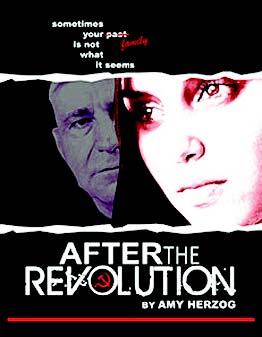The year-round Caldwell Theatre Company in Boca Raton is an A-1 class act.
By Warren Day
The class shows in the challenging plays they perform, and not the endlessly-repeated comedies and classics that compose the repertory of many a theater company. The class shows in the sets, which are not only beautifully designed, but also add meaning to the characters and the story. It also shows in the theater building itself, the Count de Hoernle Theatre, one of the most effective and pleasant performing spaces in all of Florida. And usually, the class shows in the high-quality of the acting, with their casts filled with professional talent who’ve earned their Actors Equity union cards. Under the creative leadership of Clive Cholerton, it’s simply one of the best theatre companies in the Sout
Their premiere production for the 2011- 2012 season, “After the Revolution” by Amy Herzog, hits the mark on most of its high standards and speaks well for the season ahead.
First of all, the play was picked by the New York Times as one of the ten best of 2010. It deals with a situation and a theme that has an importance and an appeal outside of its own historical context. What do you do when you discover that the pride of your family, someone who you’ve emulated in your personal and professional life, turns out to have a secret that reveals a much darker side to his character? To some degree, we all need heroes in our lives, but it can be quite dicey to have a family member as one, because if anything should go wrong, the fallout can extend into so many relationships.
In “After the Revolution,” the pride of the family is the grandfather, a kind of Alger Hiss character who achieved fame in the 1950s by not naming names at the McCarthy hearings and for being a spokesperson against the witch hunts of the times that treated every person on the far left as a traitor. The play takes place in 1999, 18 months after the grandfather has died. His granddaughter Emma has just graduated from law school and started a legal defense fund to promote his ideals. Her dreams, values, and career are tied up with the heroic image of her grandfather, and then she learns he wasn’t who he seemed to be.
It’s a dilemma that’s been faced by other families, such as the televangelist who’s caught paying for the services of a male prostitute, the politician who highly embellishes his military service or family background, or the father who everyone thought was a genius businessman but instead has been running a ponzi scheme, and, of course, the lesser and more common experience of finding out at sixteen that your parents simply aren’t as perfect as you once thought they were at six.
The drama and the comedy of “After the Revolution” is in how Emma reacts to learning about her grandfather’s unsavory past, a past about to be revealed to the world in a new book. And it’s also where the play (and casting) runs into some trouble. Emma is not a sympathetic character because she suffers from the same fault of almost everyone on the far left or far right – she’s filled with self-righteousness. The fault is partly in how she’s written, and even more so in how she’s played by Jackie Rivera, who goes more for the anger than the hurt, more for the petulance than the vulnerability. You begin to feel sorrier for her family and boyfriend than you do for her. The rest of the cast find more shadings and nuance in their performances, such as Gordon McConnell as her father, Nancy Barnett as her stepmother, and particularly Howard Elfman as a kindly and wise benefactor who learned long ago that the bigger the man, the more likely, the bigger the fault.





